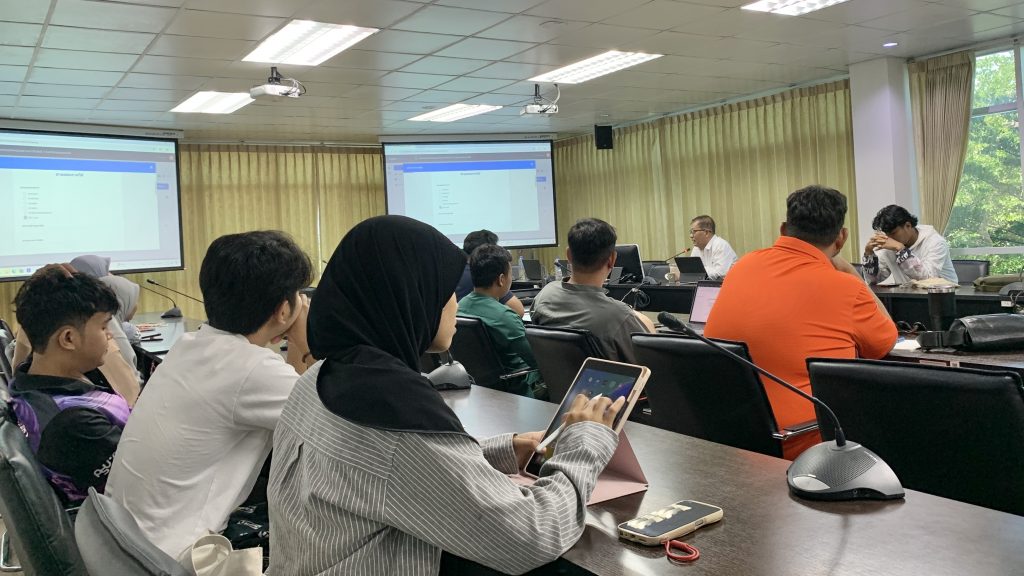
Asst. Professor Dr. Anwar Koma, a local government lecturer at the Faculty of Political Science, initiated an innovative outdoor learning system for the Non-Government Organization Class. Each week, 8 students are invited to explore and learn directly from various Non-Governmental Organizations (NGOs) in Pattani. On August 6, four Indonesian intern students participated in this outdoor course. Some of them came from different universities: Dewi Indah Berliana and Dayandri Trisatya Fatanabullah from the State University of Malang, Siti Latifah from STIT At-Taqwa Ciparay Bandung, Rasyid Muhammad Syavie from STBA Bina Dinamika Bekasi. The local government and Indonesian students had the opportunity to visit the Deep South Watch (DSW) Community in Pattani. This class was conducted during a group meeting with some of the DSW teams from each province at the Faculty of Communication Sciences, PSU Pattani Campus. Through this class, the main goal was to provide an insightful knowledge of the projects that the community works on, by allowing the students to have a field experience.
Deep South Watch (DSW) is an NGO that focuses for monitoring, researching, and providing information on conflict and peace in Southern Thailand, especially in the 3 Muslim majority provinces of Pattani, Yala, and Narathiwat. DSW serves as a resource for information that improves understanding of the social, political, and security situation in the province. Deep South Watch encourages discussion and peaceful solutions through evidence-based approaches and collaboration with various stakeholders, including local communities, academics, and non-governmental organizations.
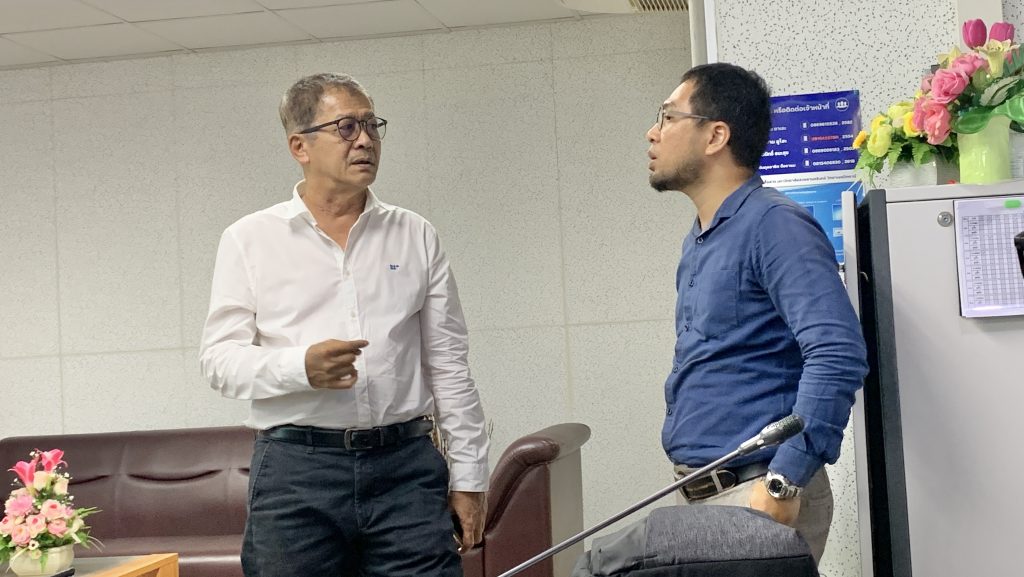
Prof. Dr. Srisompob Jitpiromsri
This community was founded by Prof. Dr. Srisompob Jitpiromsri, a leading academic and researcher in Thailand. He is also a professor at the Faculty of Political Science, Prince of Songkla University (PSU), Pattani Campus. The DSW was initiated to observe and analyze the conflict situation in Southern Thailand and to provide accurate data and information to the public and relevant stakeholders to promote the peace process in the region. To collect data accurately, they use a device with the help of a special application, KoboToolbox. The DSW team will collect GPS point locations with 3 pictures of the checkpoints to identify and will be uploaded to the KoboToolbox. The important things for the picture should include the problem of why the checkpoint is not working in that region. DSW has divided the checkpoints into 5 types as shown in image 2. This classification helps to systematize the data collected so that the analysis is more focused and effective. This data collected is a closed research (private) and the data should not be posted on any social media or other public platforms.
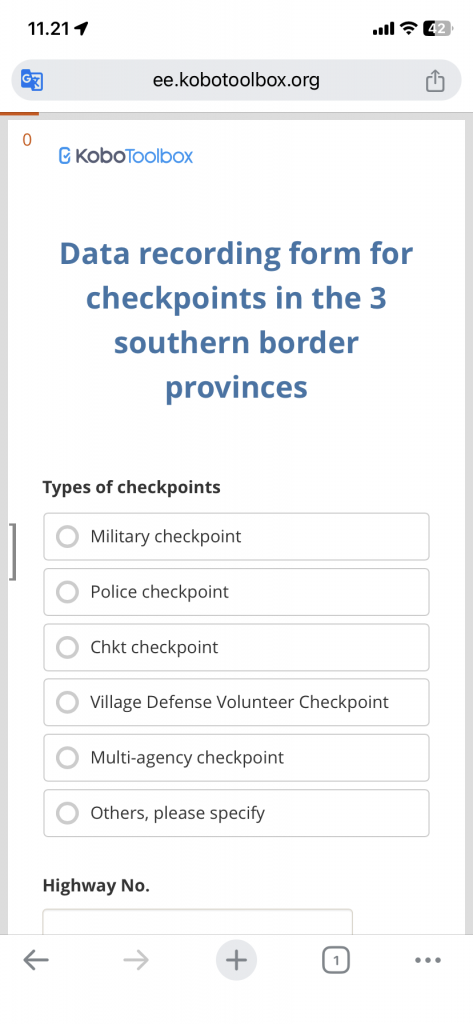
The KoboToolbox is a user-friendly application with many features that everyone can use at the same time. Data collected from various devices can be directly synchronized into one centralized database, which allows for a more holistic and comprehensive analysis. Deep South Watch (DSW) uses KoboToolbox to collect GPS location and images from checkpoints in conflict areas, which were then analyzed to capture a more detailed overview of the situation on the spot. The data collected is crucial for identifying checkpoints that are not functioning properly.
“The action on checkpoints which are not well maintained should be improved and made available to the public as soon as possible so that the checkpoints can be used,” said Dayandri who is an Internship student from Indonesia.
In addition, KoboToolbox can be used offline, which is especially important for researchers working in remote areas or conditions with limited internet access. After that, the app will automatically upload the data to the server when an internet connection is available. The application’s advanced features have the support of parliaments and have successfully analyzed more than 2000 checkpoints in Southern Thailand.
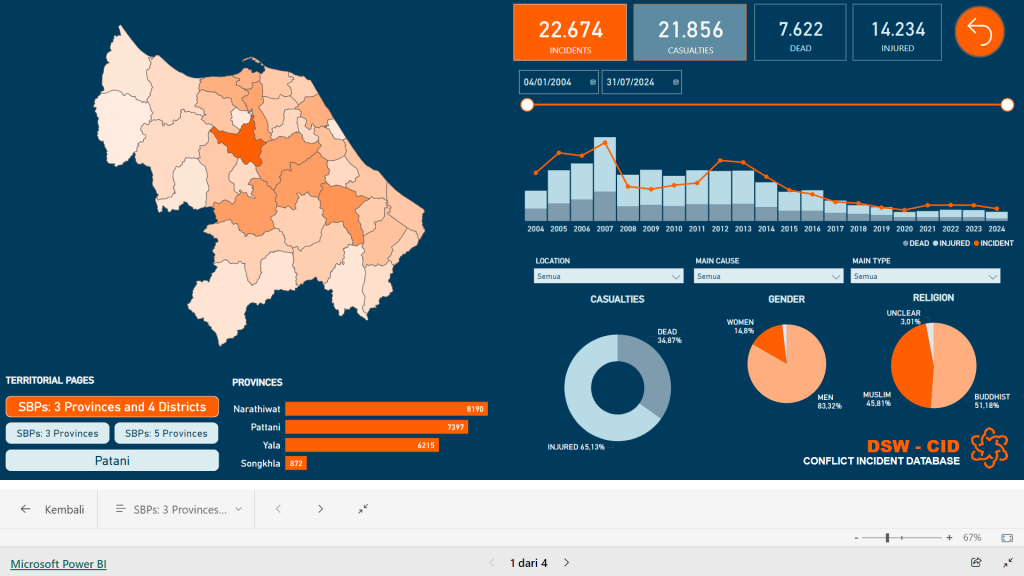
The contribution of Deep South Watch is having a database for used research which is only used for academic purposes. However, the database will not help in policy research. Deep South Watch for helping to open up to the community looking for research evidence and data related to the community. Another important thing is that the data and research conducted by Deep South Watch are meant to protect the community, like the community and individuals in Southern Thailand. For example, they are conducting research on the Checkpoint which is a result of state policy, so this policy has impacted the lives of the community. Therefore, this is one of the ways they are protecting the community by conducting research.
In the past, there have been many incidents, but people don’t know the scale or the frequency of these incidents. The people and media also don’t have such data about the conflict yet. Based on that, Deep South Watch comes to provide a database of these incidents. Deep South Watch had already been doing this before 2004. But in 2004, the number of incidents dramatically increased, from 100 to 1,000. If they don’t have data, they cannot solve the problem correctly. Deep South Watch has helped to address this issue and how to use data to solve the problem.
“Deep South Watch is one of the NGO that play a very crucial role in helping people in Southern Thailand. Through the data they reported on the Kobotoolbox app, they were able to get accurate information about the amount of people who were arrested by the military in the three provinces of Patani, Yala and Narathiwat. This information was useful for the discussion to find some solutions to the problems in the area,” opined Siti, who is an Internship student from Indonesia.
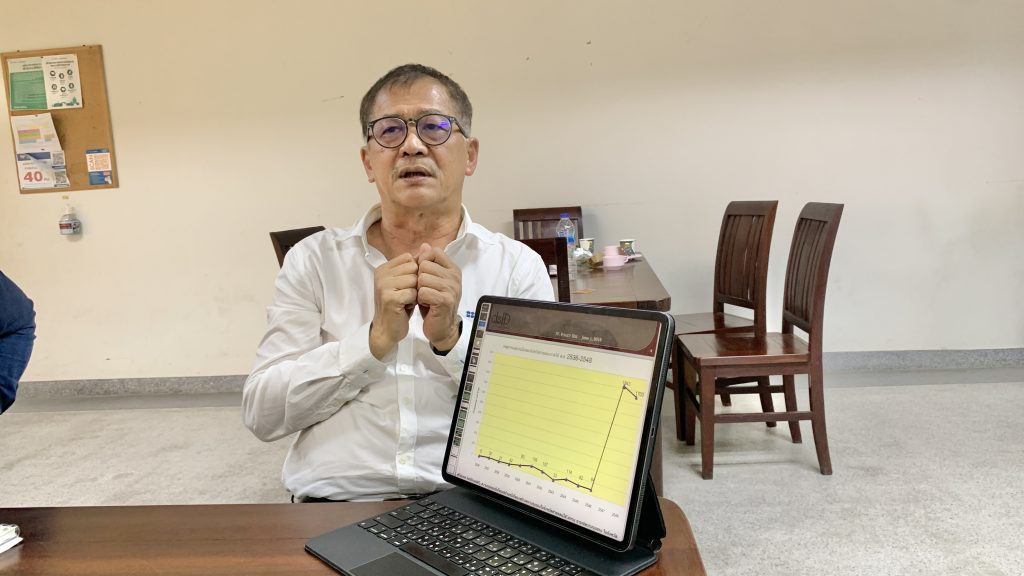
happened from 1993 to 2005
In addition, Deep South Watch started this work with three main focuses which are academics, civil society networks, and media networks. For data collection and database, the first is using standardized definitions. The second is local capacity building. So, the local community needs to acquire knowledge and use it as well. The third is procedures, and the last is safety, including data security.
“Deep South Watch is here because of knowledge. It means knowledge as a power,” said Prof. Dr. Srisompob Jitpiromsr, a founder of DSW.
The government uses power to control knowledge. Meanwhile, in academia, they use knowledge to direct powers. This is what Deep South Watch did through knowledge-based policies and an effective and sustainable database. Deep South Watch also tries to open and explain what is known as an educational space. In that context, to control how the state tries to control society, Deep South Watch tries another way by using the capability that the government can achieve, which is an educational space.
“The Deep South Watch (DSW) community in Thailand represents a great opportunity for development in Indonesia, specifically in innovative conflict and peace monitoring and data collection for academic and humanitarian purposes. This innovation is needed in regions such as Papua, which have limited access to accurate and detailed information on local conflict conditions. I hope for the future, it will get support from various stakeholders, including the government, universities, and local communities, for sustainability and successful implementation of an effective and sustainable program,” said Dewi, who is an Internship student from Indonesia.
More Information:
https://deepsouthwatch.org/index.php/th
https://www.facebook.com/share/o9hA26c1XyAbwzKs/?mibextid=LQQJ4d
https://www.kobotoolbox.org
Keywords : Southern Thailand Conflict, Academic Research, Security, Checkpoints, Non-Government Organization
Author : Dewi Indah Berliana as an intern student from State University of Malang Indonesia under the supervision
of Asst. Prof. Dr. Anwar Koma, Faculty of Political Science, Prince of Songkla University, Pattani Campus
Reviewer : Dayandri Trisatya Fatanabullah and Siti Latifah.